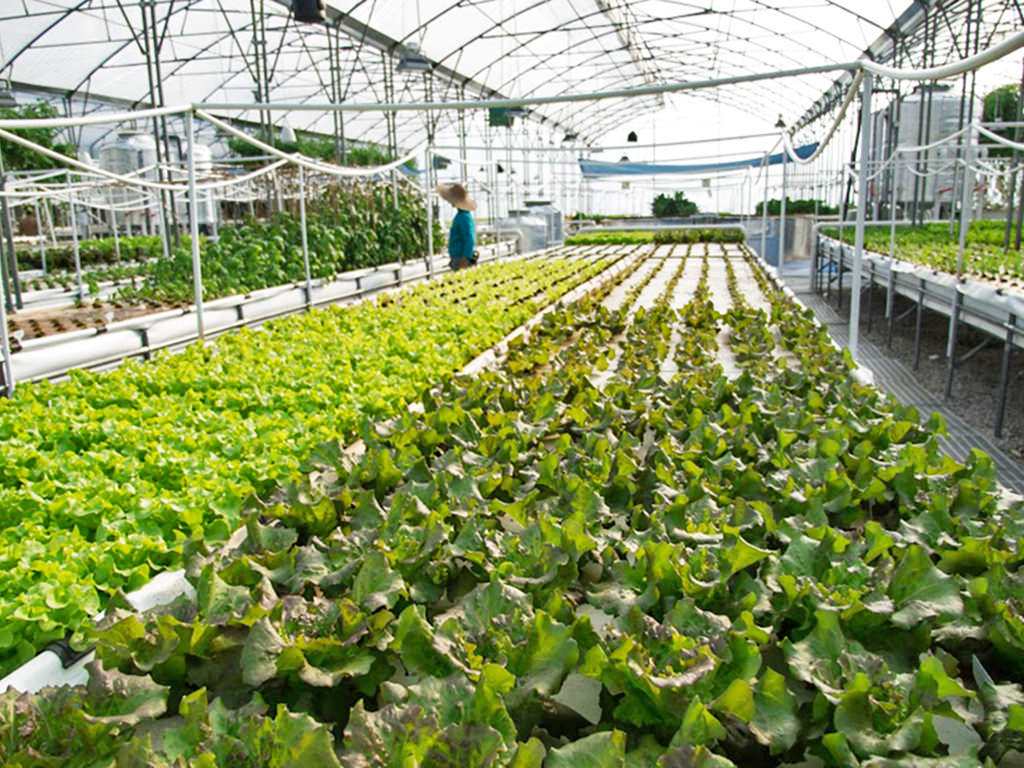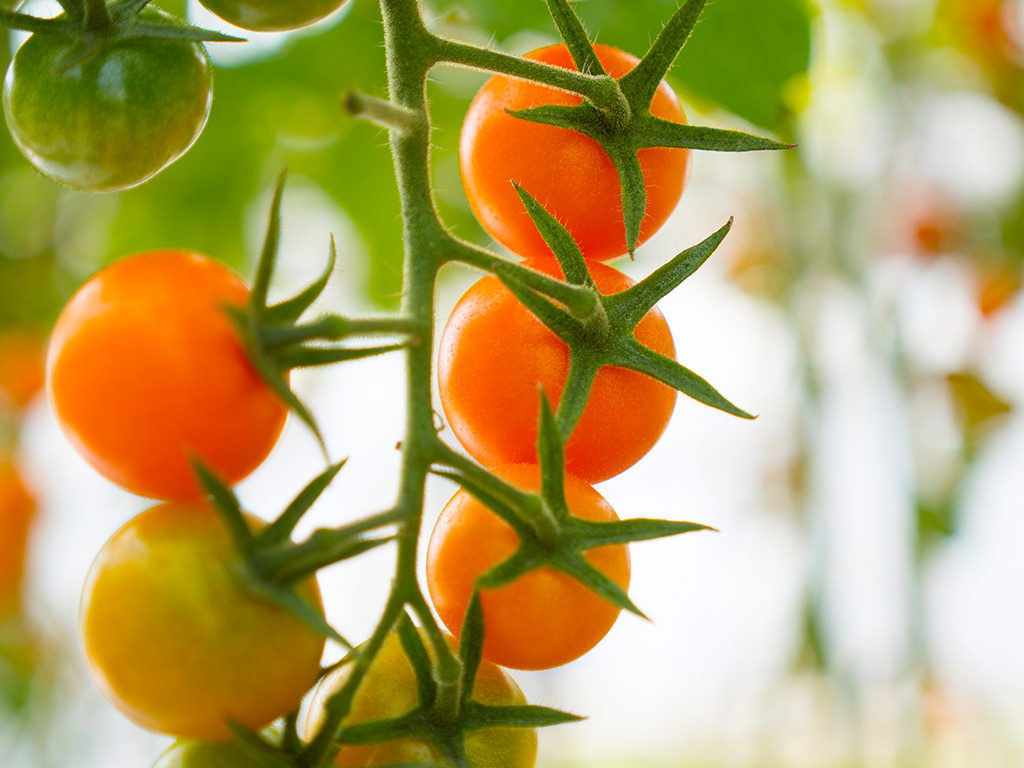6 Mins Read
After a pleasant drive into the New Territories, amidst interspersed farm fields and abandoned lots, we arrived upon an unassuming green house in Lau Fau Shan that is the cosy home of organic farming pioneer Evergreens Republic, Hong Kong’s first USDA Organic certified aquaponic farm. The USDA Organic logo signifies adherence to the country’s National Organic Program, which governs the US’s organic farming regulations. In fact, Evergreens is one of the only certified USDA Organic farms in Hong Kong period- aquaponics or not (there are less than 4!).
Whilst some hail aquaponics as potentially revolutionary for humankind, others are less enthused. So what’s all the fuss about? What is aquaponics and why is it so controversial? Green Queen investigates.
Aquaponics 101
Aquaponics is a method of farming that combines aquaculture (aka fish farming) with hydroponics, the process of growing plants in water instead of in soil. An aquaponic farm is typically a symbiotic system where a farmer uses fish (Evergreens’s farm has 3, 000 koi fish) that live in large water vats and fertilize the farm’s crops with their nitrogen-rich waste (aka fish poop). The plants then clean and filter the water keeping it fresh and healthy for the fish. It’s similar in thinking to the age-old practice of using cow manure on a traditional farm. Aquaponic farms sometimes supplement with soil replacement substances: Evergreens uses coco peat, made from coconut fibers (a by-product of coconut farming) to enhance plant growth, thereby enhancing the farm’s zero waste factor.
Hydro Vs Aqua: What’s The Diff?
Hydroponics, the process of growing plants in water instead of soil, is actually very different from aquaponics, even though the two are regularly conflated. In hydroponics, plants are grown in water with the addition of a mineral-rich fertilizer solution, either organic or conventional/synthetic, to provide the plants the nutrients they need such as nitrogen, phosphorus, potassium, sulphur, calcium and magnesium, as well as trace minerals. In aquaponics, there is no solution, the plants are instead fertilized by fish waste, so the farmer’s main input is fish food (Evergreens uses certified organic fish feed).
You probably regularly consume commercial hydroponic tomatoes and lettuce, even if you don’t realize it. Hydroponic farming has been in practices for decades and is widely used by large produce conglomerates in Europe (namely greenhouse-heavy Holland and Spain) though most of it makes use of synthetic fertilizer solutions.
Proponents of aquaponics swear that their produce simply taste better than the hydroponics kind. In fact, the Evergreens Republic founders had originally planned to start a hydroponics farm but they were disappointed by the taste of their yield. They kept searching for a better solution and eventually found their way to aquaponics.
Nutrition Wars
People are always asking: which type of farming leads to the most nutritious produce. There are no clear-cut answers folks. One must consider the long list of factors that impact that piece of kale you just ate. Here are some to think about: How long ago was it harvested? How was it picked? Did it spend time on an airplane? What nutrients and minerals was it exposed to during growth? Is the land it grew on over-farmed, which can lower the nutritional value of produce by as much as 80%? Some organic farms with best-practice soil management will produce incredibly nutritious veggies, whilst other who are doing the bare minimum will not. Even the best organic produce in the world loses a lot of its nutritional mojo when it is shipped across great distances.
There are so many points to consider when purchasing produce, even if it is certified organic. A farm like Evergreens, where every single input from the fish feat to the coco peat to the plant seeds (with many being heirloom varietals) is certified USDA Organic, and every material used in the greenhouse is tested for safety, and the produce is hand-picked mere hours before it is delivered to you, you can be assured that you are maximizing the produce’s nutrition potential.
Better For The Planet, Better For Us
The development of farming and agriculture is undoubtedly one of the highlights of human history. Without the food supply security that agriculture provides, the world’s population could not have grown beyond the hunter-gatherer setup. Hong Kongers are for the most part divorced from where our food comes from. Most of Hong Kong’s food is trucked over from China, and the rest is flown in from various parts of the globe. Far from ideal on the carbon footprint count. Being so dependent on imported food is dangerous on many levels. Hong Kong desperately needs farms like Evergreens that offer citizens safe, fresh, nutritious foods. Not to mention that aquaponics farming’s closed-loop system is highly efficient and offers a great deal of benefits:
- The ability to grow many crops year-round: the closed greenhouse environment means aquaponic systems are less affected by weather changes, if at all.
- The increased production yields (as much as ten-fold) from growing crops vertically: without the need for soil, the high cost of land is less of an issue.
- Aquaponics is a great solution for land-poor cities where it is difficult to find the space for a multi-hectare farm.
- Thanks to smart recycling techniques, aquaponic farming uses one tenth of the water than traditional farming does, not to mention that there is no groundwater-polluting runoff.
Other purported benefits of aquaponics include: its low-to-no-waste system, faster growing crops, no weeding or artificial fertilizers needed, and larger vegetables/leaves as compared to traditionally farmed produce that stay fresh longer.
There Ain’t No Perfect World
As with any system, aquaponics has its limitations, the biggest being that it is not suited to growing larger root vegetables or alliums (garlic, onions, shallots, scallions, leeks). Pests are another problem: an aquaponic farm is no less vulnerable than a traditional one in this regard. Aquaponic systems also demand large upfront costs: it’s expensive to setup. Other challenges of aquaponic farming? Constant water monitoring, managing the fish supply/keeping them healthy and finding staff with technical know-how.
Evergreens’ Bounty
The day we visited Evergreens, we were greeted by rows and rows of lush, vibrant green plants: a wide selection of Western and Chinese leafy greens including every kind of kale and chard, all types of herbs, an impressive selection of lettuces with all sorts of mustard greens- basically a green-lover’s paradise. We also found pickling cucumbers, bright purple eggplants, Hong Kong’s best selection of tomatoes (think Beefsteak, purple heirloom, black cherry), the most incredible watercress, fragrant lemongrass sticks and brightly colored sweet peppers. Needless to say, our baskets were overflowing when we went home. The Evergreens packing team so lovingly layers each green leaf too in special paper that keeps your greens fresh in the fridge.
Evergreens Republic offers a la carte ordering from their webshop, or you can go for one of their subscription packages; delivery is free for HKD 300 or more and all produce is harvested upon order.
Images courtesy of Evergreens Republic.









